Last Updated on: 11th March 2024, 11:41 am
#1 top pick

Mdina & Rabat Walking Tour
- ⦿ Walking tour of Mdina and Rabat with an expert guide
- ⦿ Take in all the highlights, including Palazzo Falzon, Vilhena Palace, Palazzo Santa Sofia, and the Cathedral of Saint Paul.
- ⦿ Visit Rabat’s old quarter where you can enjoy Maltese vernacular architecture
- ⦿ Since the tour ends in Rabat, you can visit St Paul’s Catacombs on your own and spend as much time on site as you wish
- ⦿ Duration: 2.5 hours
- ⦿Rating: 5 out of 5 stars (133 reviews)
Main Topics of How To Visit St. Paul’s Catacombs in Rabat, Malta
These underground tombs date back over 1,900 years. They reveal very interesting facts about the way ancient civilizations such as Romans used to bury their dead.
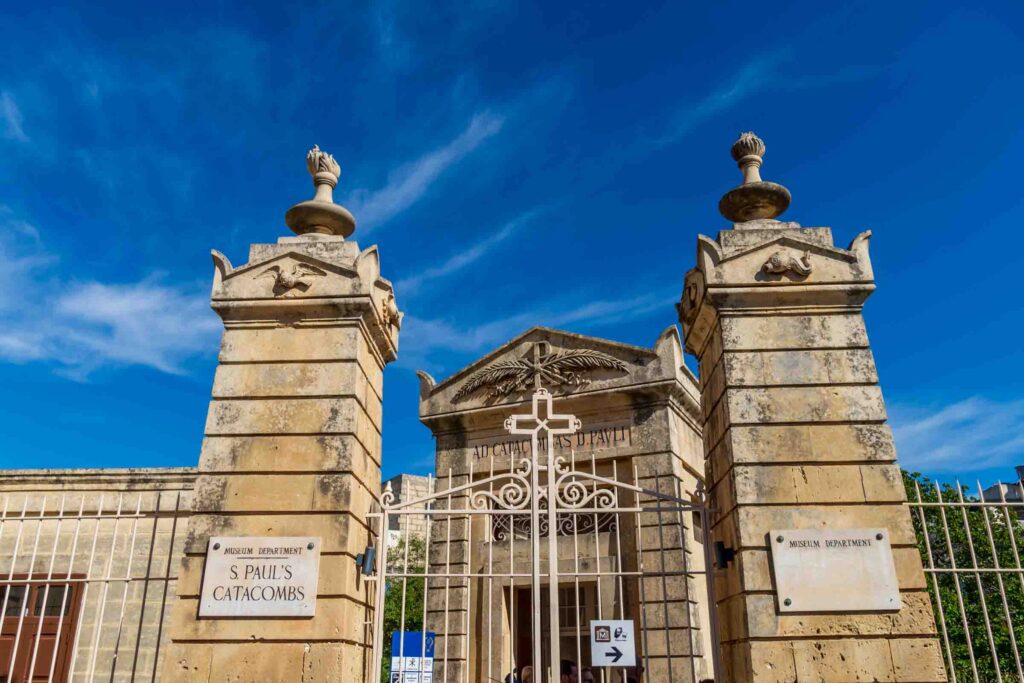
St. Paul’s catacombs – Main gate, visible from a distance, you can’t miss it – the ticket office is on the side
Visiting Details
Here’s a comprehensive guide to exploring St. Paul’s Catacombs in Malta.
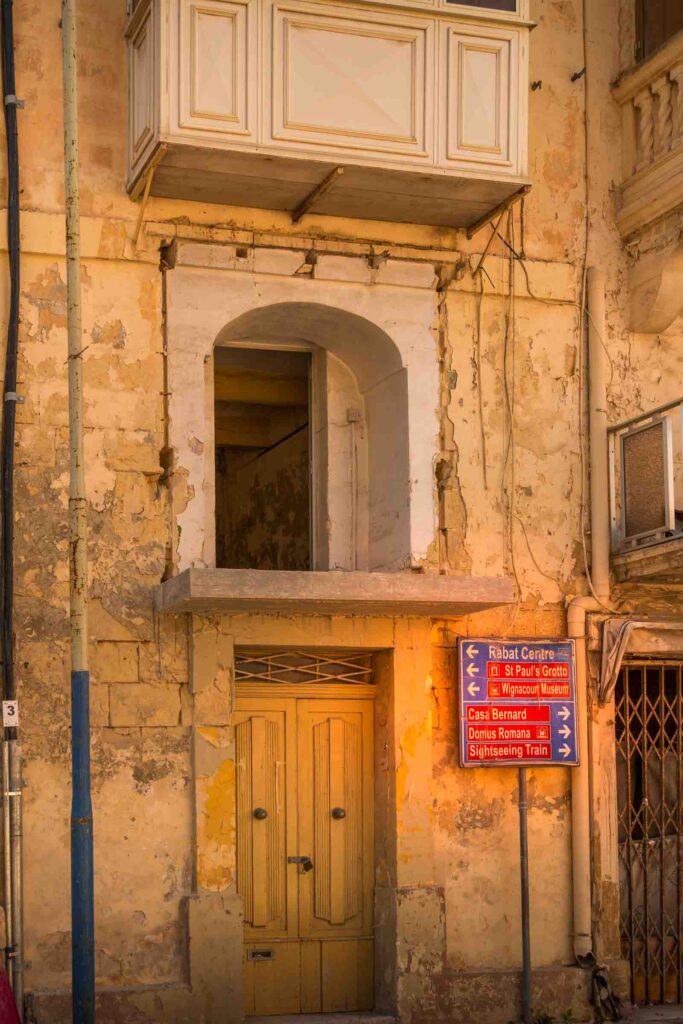
Finding your way around Rabat is easy, thanks to such street signs
Location
St. Paul’s Catacombs sit just outside the fortified medieval city walls of Mdina in Rabat on St. Paul Street.
Signs point visitors entering from Mdina’s Greek Gate down the narrow winding alleyways.
To make the most out of your commuting time on Malta, you’ll probably want to visit both Mdina and Rabat in one go.
Read my article about visiting Malta in April to learn why this is the perfect time to visit Mdina and Rabat.
There would be enough time to stop by St. Paul’s Catacombs, as well.
History buffs may want to visit other catacombs in Rabat such as St. Agatha’s crypt, catacombs and museum, St. Augustine catacombs, and St. Cataldus Catacombs.
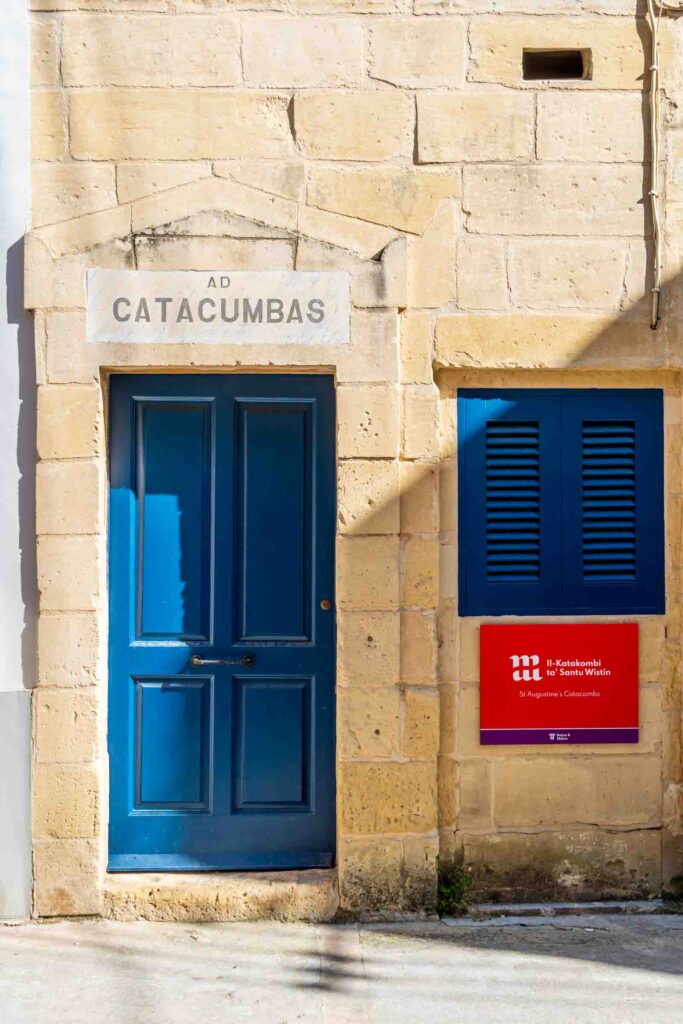
Opening Hours
Saint Paul’s Catacombs are open daily from 9:00am until 5pm. According to their official website, St. Paul’s Catacombs Complex is closed on Tuesdays.
Click here to see up-to-date info on the opening hours of all museums in Malta.
Tickets
Adults (18+): €6.00
Youths (12-17): €4.50
Senior Citizens (60+): €4.50
Concessions & Students: €4.50
Children (6-11): €3.50
Infants (1-5): Free
Tours
There’s no need for a professional guide to understand the various rooms and functions of the burial chambers and corridors.
However, if you want to have the commute organized and managed for you, you can book a private tour that traces the footsteps of St Paul in Malta.
Click here to see more details about this tour of Rabat and St. Paul’s catacombs and to book your date.
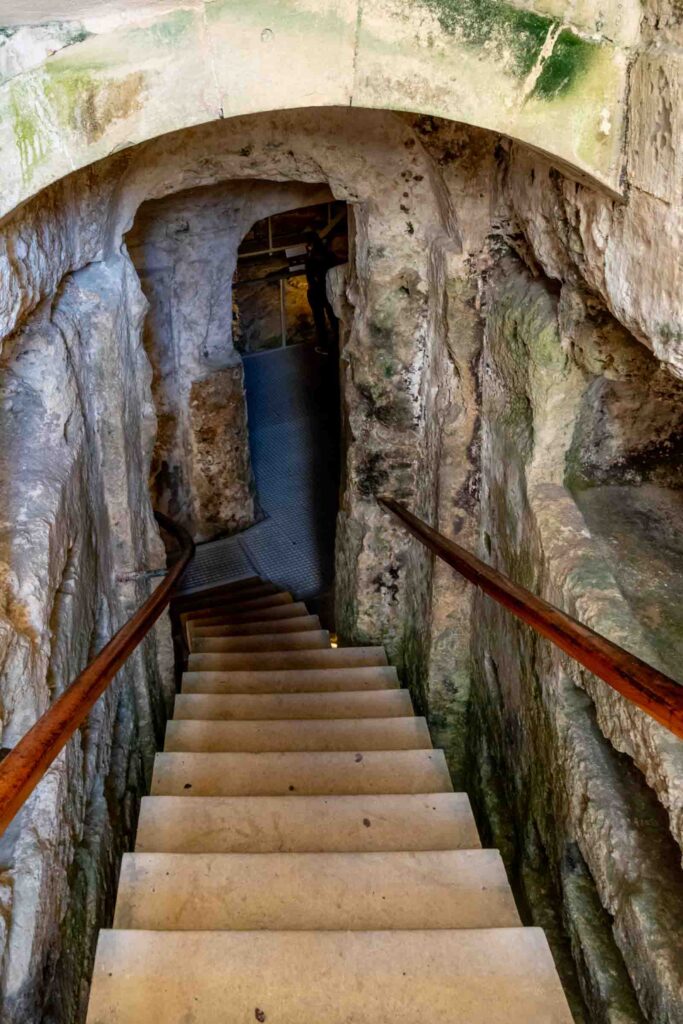
The stairway down the largest catacomb in St. Paul’s complex
The underground maze reaches deep into the hillside comprising over 20 intersecting corridors, alcoves and family burial chambers. Early Phoenician rock-cut tombs dating to the 4th century AD mix with Roman architecture designs across three-levels.
Look for engraved inscriptions, stained glass windows and a sacred altar deep within the caves used for burials and funeral rituals over 700 years up until the 4th century. Displays also outline excavation and preservation efforts still underway today.
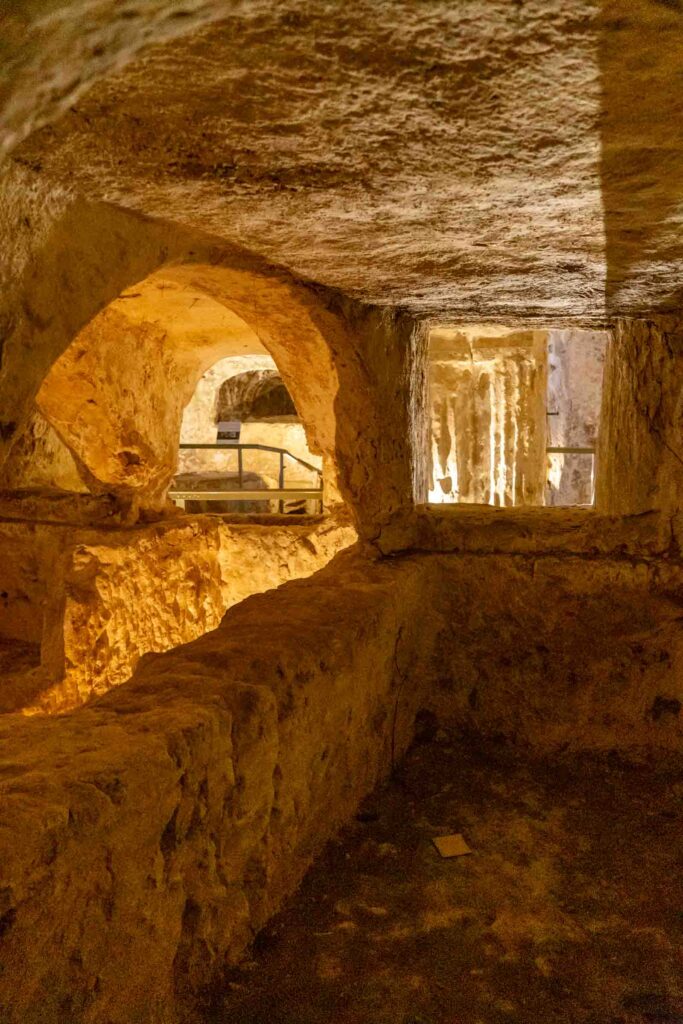
The complex consists from an array of different catacombs and burial chambers with separate entrances, connected through a stone walkway.
You’ll walk through the site, following the designated pathway, and you’ll enter whatever chambers you want.
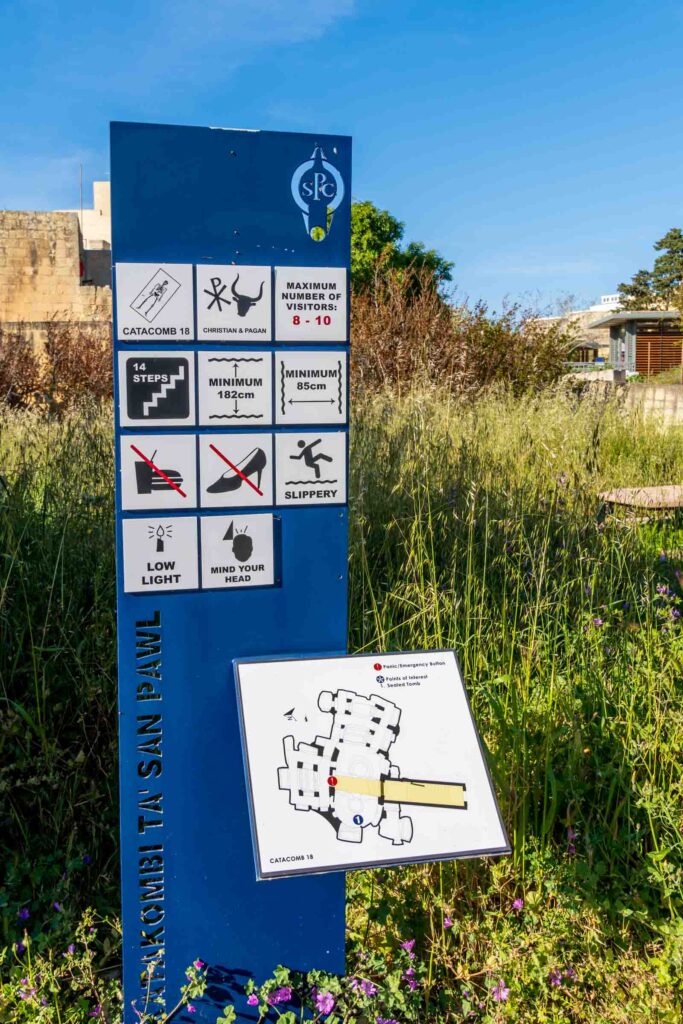
Signs by each underground entrance display useful information for visitors such as the height and the width of the chamber, the number of stairs and the maximum allowed number of simultaneous visitors
The signs by each entrance offer details on the number of steps to descend and of the size and capacity of the chambers. They also display whether the monument is Pagan or Christian (or both).
Nearby Attractions
Combine St. Paul’s Catacombs with visits to the adjacent St Paul’s Church and Grotto – one of the holiest Christian sites where the apostle Paul brought Christianity to Malta in 60AD.
Click here to book a guided tour to all of these places.
Allow extra time to wander past medieval chapels and gardens within the old walled city of Mdina just steps away to maximize your understanding of Malta’s incredible history.
With its millennia of various early Christian burials customs visible firsthand, St. Paul’s Catacombs create a memorable glimpse into our past.
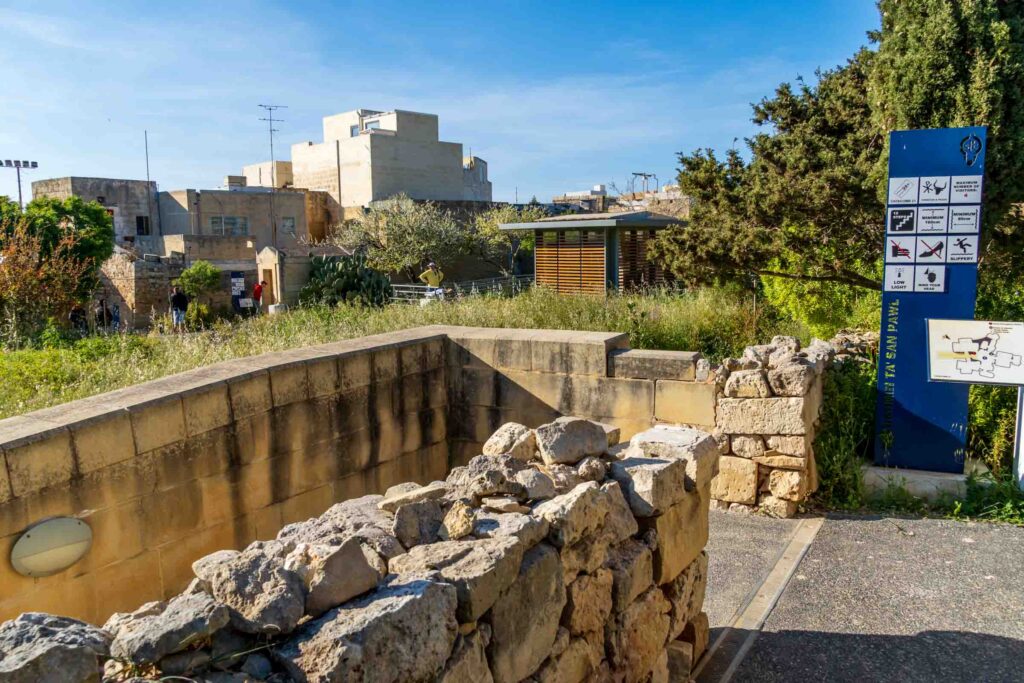
You don’t have to visit all of these caves, unless you’re truly passionate about burial chambers
There are a few key features that make St. Paul’s Catacombs in Malta uniquely fascinating for visitors:
1. Antiquity – As an archaeological site, these catacombs date back nearly 2,000 years to the Phoenician and Roman eras. The intricate tombs are carved directly out of the native coralline rock underground. This offers a rare window into ancient burial rituals.
2. Preservation – Considering their age, the catacombs remain remarkably well-preserved after centuries of abandonment. Complex decorations, carved crypts, passages and remnant mortar work still testify to meticulous construction.
3. Extensiveness – The vast underground system stretches over 500 meters with more chambers still being unearthed. Layers intersect across three depths, reflecting different eras. It gives unique insight into how much larger the scale of tombs were compared to what is visible presently.
4. Christianity Insights – As one of Malta’s first Christian worship sites, the tombs represent how early Christians co-opted complex Phoenician tombs. Unique iconography and altar rooms offer academics greater understanding around early church integration locally.
5. Location – Located inside the modern town of Rabat, very close to medieval Mdina, the site’s hidden subterranean mysteries lie just meters below unsuspecting tourists strolling the alleyways above ground. This secret labyrinth concealed below the historic religious capital city adds to its allure.
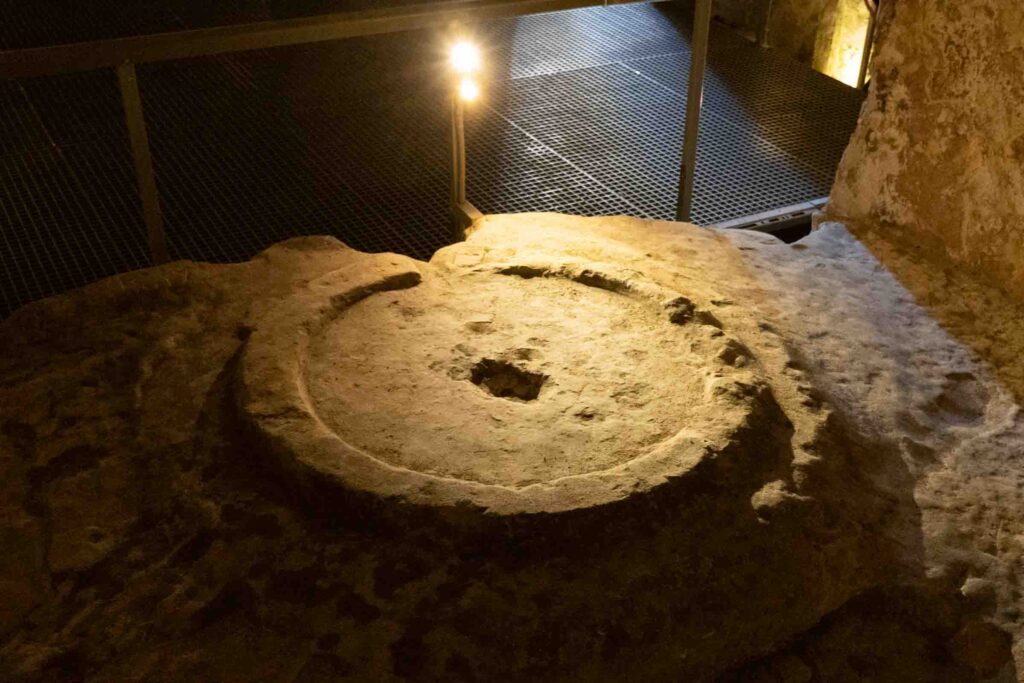
As far as I remember, this is a ceremonial table
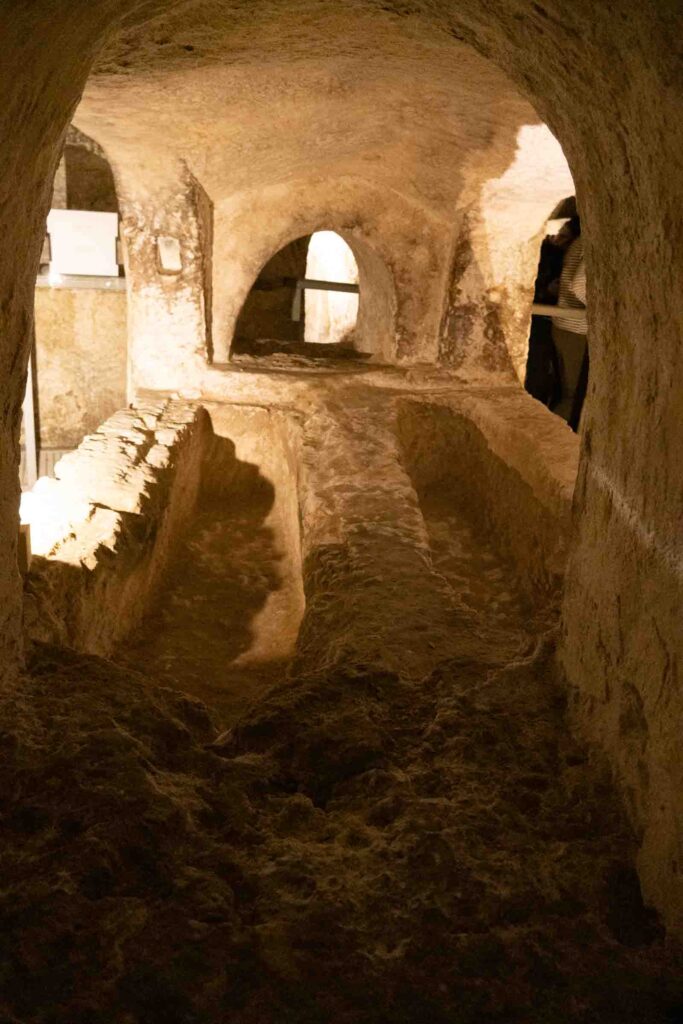
The catacombs stand out as more than just underground stone graves due to their academic value offering anthropological and architectural insights tracing Malta’s spiritual evolution over 7,000+ years of history.
I highly recommend a visit to St. Paul’s Catacombs, should you assign one day of your stay in Malta to exploring Mdina and Rabat.
One hour should be enough for you to visit all of the burial chambers on site.
Before you go, read my article about Mdina to see whether it is worth visiting.
- Dingli Cliffs: How To Visit Malta’s Highest Point - April 24, 2024
- Blue Grotto Malta - April 23, 2024
- Ramla Beach Gozo, Maybe the Best in Malta - April 9, 2024

